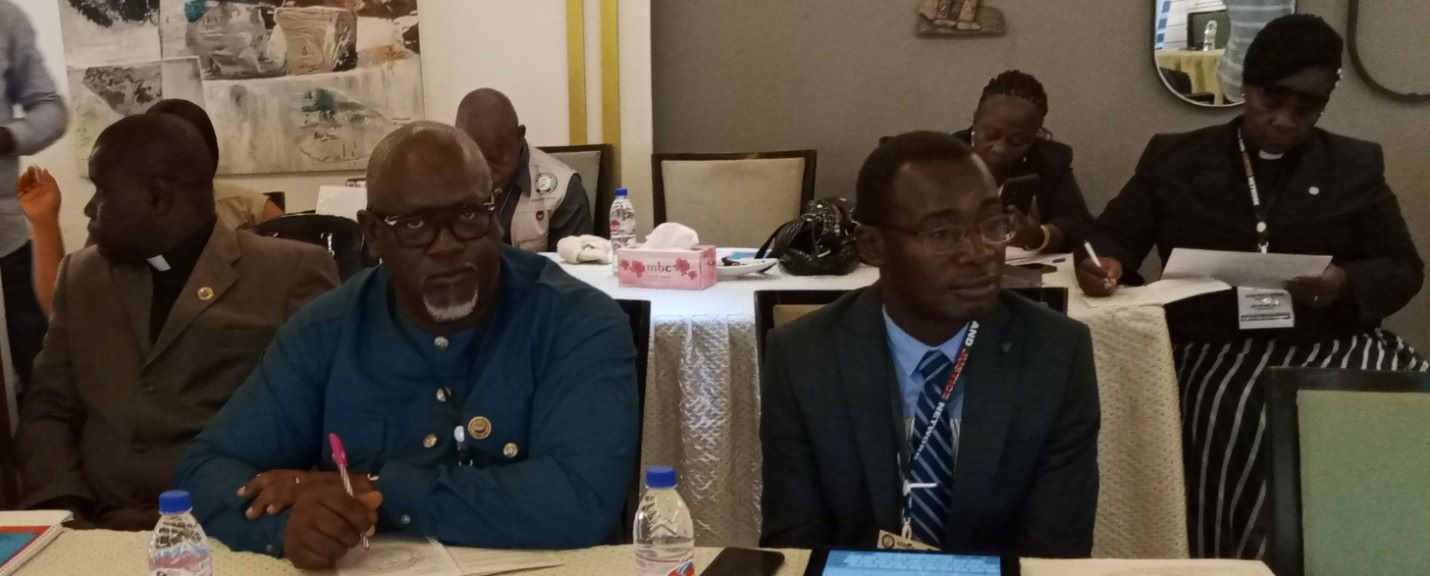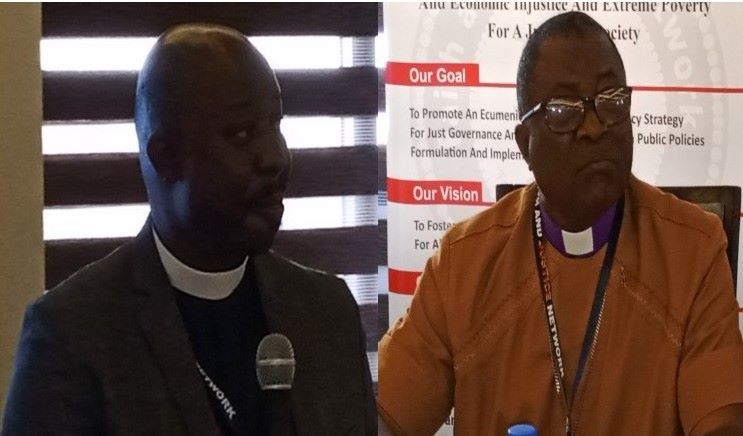As Faith And Justice Institute Ends Training
PHOTO: Rev. Dr. Tolbert Jallah and Bishop Samuel Quire
The Faith and Justice Network has ended a two-day training aimed at strengthening the skills of heads of Christian denominations on human rights and championing the advocacy of the oppressed in the Mano River region in Monrovia.
The regional workshop, which was doped training, certification and commissioning og church’s human rights monitors under the auspices of the Faith and Justice Network, brought together heads of Christian denominations from Guinea, Ivory Coast, Sierra Leone and host country, Liberia.
Speaking at the opening program, the Bishop of the Liberia Annual Conference of the United Methodist Church is encouraging Christian leaders to take the lead in championing the human rights of the people in the Mano River basin.
Bishop Samuel Quire, who is also the Chairman of the Board of Directors of the Faith and Justice Network, said :“as member of the global economical movement, we are called to be the hands and feet of Christ in the world embodying his love, grace and truth.”
According to him, the Christian faith calls on them to seek justice champion the cause of the oppressed and stand alongside whose rights are violated.”
The United Methodist Church Bishop maintained that the Mano River basin is filled strives , inequalities and injustice and it is the divine mandate to be agents of change, catalyst for transformation and advocates for human rights in this sub-region.

A cross-section of the participants at the JPN human rights training
Bishop Quire said this training serves as a crucial opportunity to deepen the knowledge of Christian leaders, reform their understanding and equip themselves with the tool necessary to promote and protect human rights within the Mano River basin and beyond.
“We gathered here at this regional human rights training not as mere participants,” he went on, “but as disciples of Jesus Christ with a profound calling because the church compels us to be the voice for the voiceless, to challenge the oppressive systems and shine the light of truth in the darkest corner of the society.”
“It is within our hand and hearts the power to make a difference resides, to bring about the more just and compassionate world for all.”
According to him, throughout this training , the church leaders explored the fundamental principles of human rights, delves into the complexity of social justice and learnt practical strategies for advocacy and social engagements.
The participants also examined the ways through which the Christian faiths inter set with human rights, understanding that they are not separated, but intertwined in God’s vision for a world where justice role down like water and righteousness likes ever flowing stream.
Giving an overview of the training, the Executive Director of the Faith and Justice Network, Reverend Doctor Tolbert Jallah, said in the MRU, there is a strong recognition there is significant weakness exists in governance , justice and security institutions in the member- countries resulting into immense human sufferings and poverty.
According to Dr. Jallah, the two-day training is in response to the urgent crisis that is confronting the sub-region and prevailing circumstances in the region.
He said that the churches, being an influential institutions since they are deeply rooted in these communities, they together can a force for the transformation of the lives of the people in these communities
“They can liberate the oppressed, uphold truth, nurture peace that is rooted in justice this opportunity for the churches because they have the mandate by setting up now a clear objective on implementing the skills and tools they have inquired from the training.”
According to him, a vast majority of the people in the Mano River Union member countries are exposed to poverty, violations of all sorts and difficulties in meeting their daily needs.
During the training, presentations were made by Jefferson Knight, Program Director of the United Methodist Human Rights Monitor; Reverend Attorney Bartolommeo Collins, former Chairman of the Independent National Commission on Human Rights of Liberia, Counselor Benedict Sarnor , former Minister of Justice , Republic of Liberia, among many others. Report by Augustine Octavius, augustineoctavius@gmail.com

